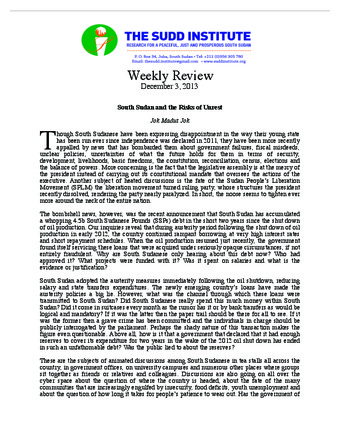South Sudan and the Risks of Unrest
Publication Summary
Though South Sudanese have been expressing disappointment in the way their young state has been run ever since independence was declared in 2011, they have been more recently appalled by news that has bombarded them about government failures, fiscal misdeeds, unclear policies, uncertainties of what the future holds for them in terms of security, development, livelihoods, basic freedoms, the constitution, reconciliation, census, elections and the balance of powers. More concerning is the fact that the legislative assembly is at the mercy of the president instead of carrying out its constitutional mandate that oversees the actions of the executive. Another subject of heated discussions is the fate of the Sudan People’s Liberation Movement (SPLM) the liberation movement turned ruling party, whose structures the president recently dissolved, rendering the party nearly paralyzed. In short, the noose seems to tighten ever more around the neck of the entire nation.
The bombshell news, however, was the recent announcement that South Sudan has accumulated a whopping 4.5b South Sudanese Pounds (SSPs) debt in the short two years since the shut down of oil production. Our inquiries reveal that during austerity period following the shut down of oil production in early 2012, the country continued rampant borrowing at very high interest rates and short repayment schedules. When the oil production resumed just recently, the government found itself servicing these loans that were acquired under seriously opaque circumstances, if not entirely fraudulent. Why are South Sudanese only hearing about this debt now? Who had approved it? What projects were funded with it? Was it spent on salaries and what is the evidence or justification?
This week, the Sudd Institute tries to answer these important questions.
Jok Madut Jok is trained in the anthropology of health and holds a Ph.D. from the University of California, Los Angeles (UCLA). He is a fellow of Rift Valley Institute and Director of the Sudd Institute. Jok has held fellowship positions at a number of other institutions, including the United States Institute of Peace and the Woodrow Wilson International Center for Scholars. He also served in the Government of South Sudan as undersecretary in the Ministry of Culture and Heritage for three years. He has also worked in aid and development and author of four books and numerous articles covering gender, sexuality and reproductive health, humanitarian aid, ethnography of political violence, gender-based violence, war and slavery, and the politics of identity in South Sudan and Sudan. His book Breaking Sudan: The Search for Peace, was published in 2017 by OneWorld.

